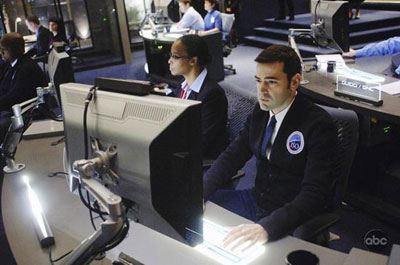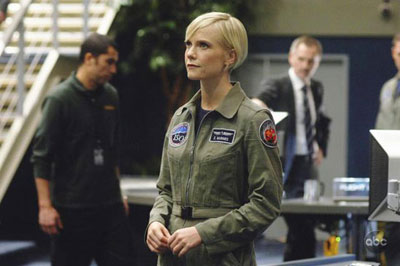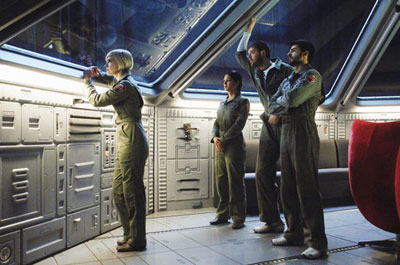|
| Defying Gravity is less interested in telling a story about exploring the solar system than it is in playing up the romantic drama among a bunch of attractive astronauts, frequently in the form of musical montages. |
The story is that an International Space Organization has built a massive spacecraft named Antares with an eight-person crew and a mission to visit seven planets in our solar system in six years. We are introduced to the crew from the start, and they’re horny. They’re also dull, shallow, flat, and uninteresting.
There’s Zoe Barnes, whose specialty is supposedly geology but who seems a bigger expert at looking perpetually dazed. Barnes is played by Canadian actress Laura Harris, who has had a career of unmemorable roles since her teenage years and is continuing that tradition. She delivers all her lines as if she’s almost out of breath. There’s no reason to like Harris, and in fact no reason to hate her. She’s just there.
Slightly more than there is Maddux Donner, a senior astronaut who becomes the Antares’ executive officer. Donner is played by Ron Livingston, whose most memorable role was as the chief slacker cubicle jockey in the almost-but-not-quite-a-classic 1999 movie Office Space. Donner is supposed to be a hero, or a tainted hero. But the problem is that it’s hard to look at him and not think of his memorable Office Space line about his career goal being to work just hard enough to not get fired.
Most of the show takes place in 2052, which surprisingly looks pretty much like 2009 (although a lack of exterior scenes in the premiere seems a little odd). Everybody dresses like we do today, nobody has bulbous heads and pulsing brains, and there’s no hint at anybody being cyber-enhanced with an iPod installed in their noggin. Early in the first episode we are treated to a flashback to 2042 when Donner and his buddy Ted Shaw (played by Malik Yoba) blasted off from the surface of Mars leaving two of their comrades behind. We later see Donner staring wistfully at a photograph of him with the woman he left on Mars, the clear implication being that he loved her.
Flash forward to 2052 and the crew of the Antares is celebrating in a bar shortly before leaving on their journey. Donner and Zoe have brief words and the chemistry between them is, well, about as exciting as mixing distilled water and Metamucil. Donner, who was Zoe’s instructor, is not on the Antares mission. This is apparently because of the Mars stigma still hanging over his head a decade later, although one cannot help but cheer when Donner shoves a British reporter who suggests that he and Shaw panicked and killed their comrades. Rather bizarrely, rather than being cheered for punching out the insulting reporter, Donner is kicked out of the space program.
 Mission control in 2052 looks an awful lot like mission control in 2009. (credit: ABC) |
Flash forward, back, forward, back
After the flashback to 2042 and Mars, we’re treated to another flashback to 2047, when Zoe first meets Donner. But this quickly gets confusing. The best I could figure out is that the two had a one-night stand just before she was selected as an astronaut candidate. Zoe got pregnant and then apparently had an illegal abortion. But back (or forward?) in 2052, Donner and Zoe—no longer involved—start having dreams about a baby, and Zoe hears it crying on the ship. It’s damned confusing, so confusing in fact that a couple of reviewers concluded that Zoe went into space while pregnant.
| What’s more disturbing is that the female characters act more like giggly schoolgirls obsessed with boys than highly focused professionals. |
From these early episodes (and I had not watched episodes 3 and 4 by the time I wrote this), it appears as if Defying Gravity is borrowing a trick from the infinitely better Lost, using flashbacks to introduce the characters and show how their personalities developed and how they got where they are now. But Lost was good at it, and certainly wasn’t confusing if you paid attention. Furthermore, Lost made both the past and the present interesting. Defying Gravity’s problem is that the writers have decided that exploring space is not more interesting than seeing Zoe and Donner engage in a drunken one-night stand, or make googly eyes at each other in a locker room.
Yes, Defying Gravity overdoes the sex angle. Several of the women are obsessed with getting laid, and one male astronaut has a massive stash of pornography onboard Antares. But what’s more disturbing is that the female characters act more like giggly schoolgirls obsessed with boys than highly focused professionals.
 “There’s no reason to like Harris,” the actress to plays Zoe Barnes, “and in fact no reason to hate her. She’s just there.” (credit: ABC) |
Amateur hour
The real problem is just how awkward, lame, and amateurish the entire production feels, despite the expensive sets and excellent special effects. The problems with the show are evident from the first scene. Donner has a dull, droning monologue that often pops up for no narrative reason (and you know that the writers needed help when the word “defecate” is one of the first spoken by the narrator). Donner’s father is a drunk who, for some bizarre reason is disappointed that instead of becoming a baseball player, his son became one of the first men to land on Mars. What an underachiever! It doesn’t make sense.
The cinematographer and editor also try to use tricks they saw in other, better sci-fi shows and only end up demonstrating how bad they are at it. For example, an early shot goes from out of focus into focus quickly, a technique used in the Battlestar Galactica miniseries to provide a cinema verite feel. Donner in his space helmet is shown freeze frame for a second, a reference to 2001’s stargate sequence. The tricks are so clumsy that they’re jarring.
Whereas the BBC’s Space Odyssey strove to be educational, Defying Gravity has technology that looks good, but falls apart when you think about it too closely. For example, a throwaway bit of dialogue explains that the astronauts’ jumpsuits contain “nanofibers” that are pulled toward the deck, mimicking the characteristics of gravity.
| After all, at a time when we are struggling with finding a justification for venturing beyond low Earth orbit, wouldn’t it be neat if a space alien showed up and made the decision a lot easier? |
But it’s the writing that most cripples the show. One of the frustrating things about Defying Gravity is that it does have clever, albeit clichéd, elements, only they’re executed badly. Donner’s tragic Mars mission, for instance, is more dull than horrific. Livingston never convincingly acts like someone haunted by the fact that he killed the woman he loved. Similarly, Zoe’s endless baby obsession is simply confusing. Is she feeling guilt over an abortion she had five years before, or being influenced by something else? A dramatic situation is rendered bland.
Perhaps the cleverest aspect of Defying Gravity is the one that is most poorly handled. We’re told at one point that the Antares is a ten-trillion-dollar mission. Even assuming that a trillion dollars doesn’t go as far in forty-three years as it does today, that’s still pretty expensive. So why did the nations of the world mount such an effort?
It turns out that there’s a secret behind Antares, even in Antares. Some kind of entity has apparently been found, or allowed itself to be found, and has communicated the need to conduct the grand tour of the solar system. The humans call it “Beta” and it is located in Pod 4 of the spacecraft. We the viewers don’t know what Beta is, and apparently the humans don’t really know either. Beta doesn’t speak. It communicates indirectly, and ambiguously. And it has powers. It causes two of the astronauts to develop heart murmurs, requiring Donner and Shaw to replace them. It is also apparently behind the porn-loving physicist’s selection for the crew. It is probably causing Zoe to hear the baby’s cries, and instigating Donner’s dreams. And it later initiates an airlock failure that exposes a leak in Zoe’s Venus EVA suit and presumably ultimately saving her life.
Beta’s not a new idea. Stanslaw Lem did something similar with Solaris, and more recently Lost has perfected the idea of mysterious forces controlling the destinies of a crew of castaways. Despite the fact that it is not terribly original, Beta is perhaps the show’s only clever trick. After all, at a time when we are struggling with finding a justification for venturing beyond low Earth orbit, wouldn’t it be neat if a space alien showed up and made the decision a lot easier?
But let’s hope that if this does happen, our female astronauts of the future will act more like female astronauts of the present… and not like the horny, shallow, unfocused characters in Defying Gravity.
